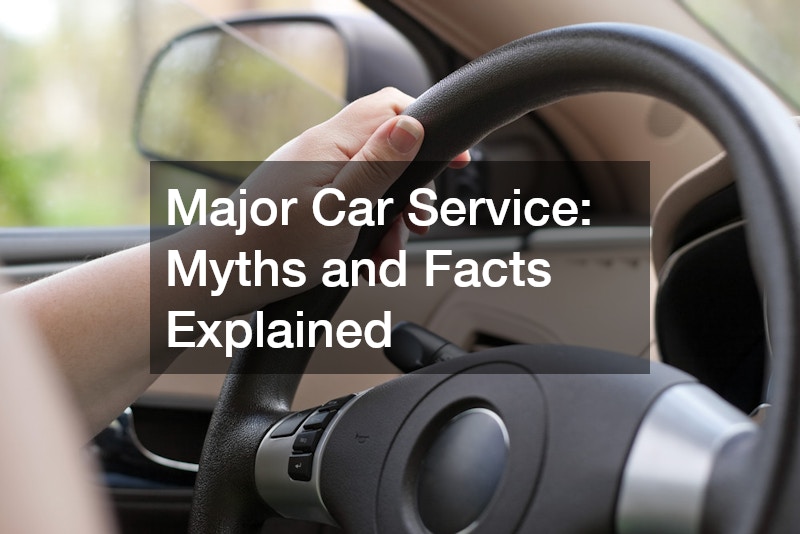

Taking Care of Your Vehicle
When it comes to maintaining your vehicle, there’s a lot of information circulating that can easily confuse even the most diligent car owner. Major car services are essential for keeping your vehicle in peak condition, but misinformation often leads to costly mistakes. Whether it’s misunderstandings about oil changes, brake repairs, or transmission services, it’s important to separate fact from fiction. Many car owners base their maintenance habits on outdated myths or secondhand advice, which can result in neglected systems or unnecessary repairs. Understanding the truth behind major car service myths ensures that your vehicle receives the care it needs without unnecessary costs or complications. This blog will dive into these myths and facts, helping car owners make informed decisions.

Common Misconceptions About Oil Changes
One of the most prevalent myths about major car service is the belief that oil needs to be changed every 3,000 miles. While this was once standard advice, modern engines and advances in oil technology have extended this interval significantly. Most cars can go between 5,000 and 7,500 miles before requiring an oil change, and some vehicles even reach 10,000 miles or more. Sticking rigidly to outdated advice can lead to unnecessary service appointments and waste valuable resources. Instead, owners should rely on their vehicle’s manual for manufacturer recommendations.
For those who want a more streamlined approach, utilizing auto maintenance schedule software can help ensure timely oil changes and other essential services. Such tools monitor vehicle usage and alert drivers when it’s time for oil changes, taking the guesswork out of the process. By using technology to track major car services, owners can avoid both under-servicing and over-servicing their vehicles, maintaining optimal engine health without excess effort.
The Truth About Engine Tune-Ups
Engine tune-ups are another aspect of major car service that often gets misunderstood. Many drivers still believe that cars need frequent, manual tune-ups, but with modern vehicles, this isn’t always the case. Advanced engine systems and onboard diagnostics have made the need for traditional tune-ups much less frequent. Many components are built to last longer, and your car will usually alert you if there’s an issue that needs addressing. Regular inspections of the engine are still important, but the days of frequent manual adjustments are largely over.
However, some aspects of tune-ups, like checking spark plugs and filters, remain important, especially if you want to maximize your vehicle’s performance. If you think about it like a garage door company ensuring that all moving parts are lubricated and functioning well, a modern tune-up is less about adjustments and more about ensuring everything runs smoothly. Routine diagnostics and visual inspections ensure the engine remains efficient and reliable, extending the life of your vehicle while preventing unnecessary repairs.

Myths Surrounding Brake Maintenance
Brake maintenance is one of the most crucial aspects of vehicle care, yet myths about when and how brakes should be serviced persist. A common misconception is that brakes only need to be checked when they start making noise or when stopping becomes noticeably difficult. The reality is that waiting for these warning signs can lead to significant damage to your brake system. Proper brake maintenance is a key component of major car service, as it helps ensure the safety of both the driver and passengers. Regular inspections allow for the timely replacement of brake pads, which wear down gradually and can prevent more expensive repairs like rotor replacements.
An auto repair shop will typically recommend inspecting the brake system during regular maintenance visits, even if there are no obvious signs of wear. This proactive approach ensures that issues like uneven wear or fluid leaks are detected early. It’s also essential to replace brake pads based on mileage and driving conditions rather than waiting for warning signs. By keeping your brakes in top condition, you can ensure optimal performance and extend the overall lifespan of your braking system.
Facts About Air Filter Replacements
Many drivers overlook the importance of air filter replacement when thinking about major car services. Some believe that air filters last indefinitely or that they don’t have much impact on a car’s performance. In truth, air filters play a crucial role in protecting your engine from dust, dirt, and other contaminants. A dirty air filter can reduce engine efficiency, decrease fuel economy, and even lead to long-term damage if neglected for too long. Replacing air filters at regular intervals helps your vehicle run smoothly and improves overall performance.
Just like replacing damaged windows through glass replacement, changing your car’s air filter is a simple yet essential task that should not be ignored. Most manufacturers recommend replacing the air filter every 15,000 to 30,000 miles, depending on driving conditions. Neglecting this small but important task can result in increased wear on your engine and reduced fuel efficiency, making it one of the most cost-effective major car services you can perform.

Debunking the Myths of Tire Rotation
Tire rotation is a major car service that’s often misunderstood, with some drivers assuming it’s unnecessary or that tires wear evenly without intervention. In reality, tire rotation is critical for promoting even wear and extending the life of your tires. Without regular rotation, certain tires—usually the front ones—will wear down more quickly due to the weight of the engine and the demands of steering. This can lead to uneven handling, poor traction, and the need for premature tire replacement. Rotating your tires at recommended intervals ensures that all tires wear evenly, which not only extends their life but also improves vehicle performance.
Similar to paintless dent removal, tire rotation is a service that, when done regularly, can prevent more significant problems down the line. Most manufacturers recommend rotating your tires every 5,000 to 8,000 miles, and this service can often be performed during oil changes or other routine maintenance. By making tire rotation a consistent part of your car care routine, you can avoid uneven wear patterns, ensure safer handling, and get the most out of your tire investment.
Understanding Transmission Fluid Changes
One of the most misunderstood components of major car service is the transmission fluid change. Many drivers are unaware that, like engine oil, transmission fluid degrades over time, which can lead to serious mechanical issues if not replaced. A common myth is that transmission fluid lasts the lifetime of the vehicle, but this is far from true. Over time, heat and friction cause the fluid to break down, reducing its ability to lubricate and cool the transmission. Neglecting regular transmission fluid changes can result in poor shifting, overheating, and even complete transmission failure.
Just as with car window repair, taking care of transmission fluid changes promptly can save you from costly repairs in the future. Depending on your vehicle and driving habits, most manufacturers recommend changing transmission fluid every 30,000 to 60,000 miles. Regular checks of fluid levels and quality can also help identify issues early. Ensuring that your transmission fluid is fresh and at the correct levels is essential to the longevity and performance of your vehicle’s transmission system.

Car Battery Myths and Realities
Many myths surround car batteries, particularly regarding how often they need to be replaced and what causes them to fail. A common misconception is that as long as a car starts, the battery is fine. However, car batteries gradually lose their ability to hold a charge, and failing to replace them in time can leave you stranded. Additionally, extreme weather conditions, both hot and cold, can severely impact battery life. Understanding how to properly maintain and test your battery is an important part of major car service, ensuring that your vehicle remains reliable.
Much like recreational vehicle repair, battery maintenance is critical for ensuring long-term performance. It’s recommended to have your battery tested annually, especially after three years of use, to avoid unexpected failures. Corrosion buildup, loose connections, and insufficient charging are common issues that can be easily addressed during routine service checks. Replacing your battery when it shows signs of weakness, rather than waiting for it to die, will prevent inconvenience and potential vehicle damage.
The Importance of Regular Fluid Checks
Fluids play a vital role in keeping your vehicle’s systems running smoothly, yet many car owners overlook the importance of regular fluid checks. It’s a common myth that as long as a car isn’t leaking, fluids are at the correct levels. However, various fluids—such as coolant, brake fluid, and power steering fluid—can degrade or evaporate over time, causing potential problems if left unchecked. Neglecting regular fluid maintenance can lead to overheating, poor braking performance, or damage to other critical systems, making fluid checks an essential part of major car service.
Just as trailer tire and wheels companies recommend regular checks to ensure safe towing, regular fluid checks are crucial for maintaining vehicle safety and longevity. Most fluids should be checked during routine services, and each has a specific interval for replacement or replenishment. Keeping a close eye on fluid levels and quality helps avoid costly repairs and ensures your car operates at peak efficiency. Regular checks and timely fluid replacements extend the life of your vehicle’s components and provide peace of mind on the road.
Clarifying Myths About Coolant System Service
One of the most common myths about the coolant system is that as long as your engine doesn’t overheat, you don’t need to worry about coolant maintenance. However, coolant not only helps regulate the engine’s temperature but also protects the engine’s components from corrosion and buildup. Over time, coolant can break down, becoming less effective at preventing overheating and corrosion. Failing to service your coolant system regularly can lead to costly repairs, including engine damage or radiator failure. Understanding the importance of regular coolant checks and flushes is critical in any major car service routine.
Similar to water mitigation efforts in home systems, maintaining your coolant system can prevent bigger problems from developing down the road. Manufacturers typically recommend replacing the coolant every 30,000 to 50,000 miles, but it’s important to monitor its levels and quality in between services. A well-maintained coolant system ensures that your engine runs at an optimal temperature, reducing the risk of overheating and improving overall vehicle performance.
The Facts on Timing Belt Replacements
The timing belt is one of the most crucial components in your vehicle, yet myths persist about its longevity and maintenance. Many drivers believe that timing belts last indefinitely or don’t require replacement unless they break. Unfortunately, a broken timing belt can cause catastrophic engine failure, leading to extremely costly repairs. Replacing the timing belt as part of major car service is essential for preventing engine damage and ensuring smooth operation. Neglecting to replace it within the recommended mileage can result in expensive repairs, far outweighing the cost of timely maintenance.
Just like knowing when to replace a propane tank in a grill, replacing your timing belt at the manufacturer-recommended interval is vital for the continued safe and efficient operation of your vehicle. Typically, timing belts should be replaced every 60,000 to 100,000 miles, depending on the make and model of your car. A timely replacement ensures that the internal components of your engine stay in sync, protecting your vehicle from severe and avoidable damage.
Implementing Car Maintenance Strategies
Understanding the difference between myths and facts when it comes to major car services can save car owners both time and money. From oil changes to timing belt replacements, knowing the truth about these essential services ensures that your vehicle remains in peak condition for years to come. Common misconceptions often lead to neglect or unnecessary repairs, which can compromise the safety and reliability of your vehicle. By staying informed and adhering to a proper maintenance schedule, car owners can avoid these pitfalls and make educated decisions about their vehicle’s care.
Incorporating regular checks, such as fluid inspections, tire rotations, and brake assessments, into your maintenance routine is vital to keeping your car running smoothly. Additionally, utilizing tools like auto maintenance schedule software helps streamline this process and prevent oversights. Addressing these services at the correct intervals, as discussed in each section, helps ensure your vehicle’s performance and longevity. Whether you’re addressing issues with an auto repair shop or conducting your inspections, debunking these myths will keep your car in optimal shape, allowing you to enjoy worry-free driving.






